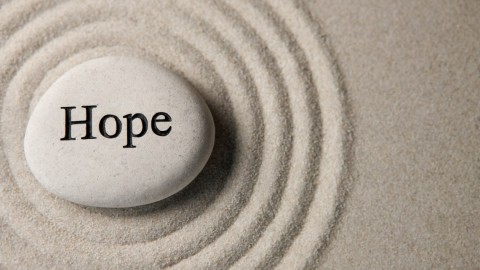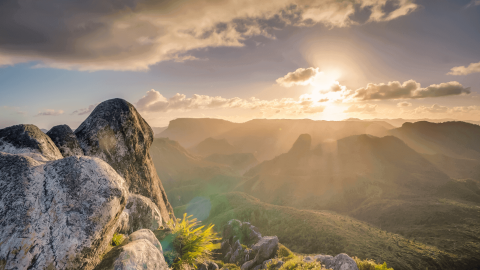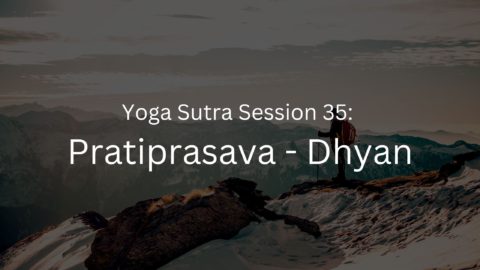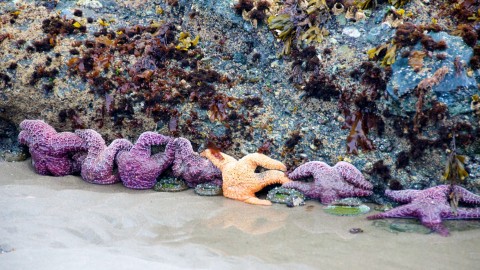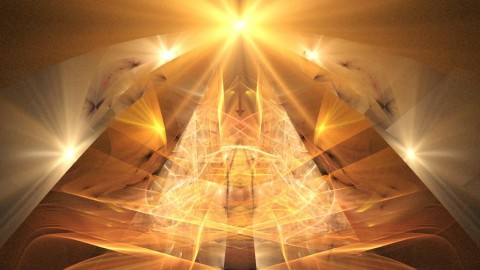Before we enter Yoga Sutra 20, let’s understand ‘What is Life?’
LIFE IS a mystery, and the first mysterious thing about life is that you can be alive and you may not have life at all. Just being born is not enough to have life.
To be born is just an opportunity. You can use it to have life, and you can miss it also. Then you will live a dead life. Only apparently will it look like life, but deep down there will be no alive current in you.
Life has to be attained, one has to work for it. It is like a seed in you: it needs much effort, soil, right soil, care, love, awareness. Only then does the seed sprout. Only then is there the possibility that someday the tree will bear fruit, someday it will flower. Unless you reach the state of flowering you are alive just in name, but you have missed the opportunity. Unless life becomes a celebration, it is not life at all.
Ecstasy, nirvana, enlightenment, whatsoever you want to call it – that is the flowering. If you remain miserable, you are not alive. The very misery shows that you have missed the step. The very misery is an indication that life is struggling within to explode, but the cocoon is too hard. The shell of the seed is not allowing it to come out; the ego is too much and the doors are closed. Misery is nothing but this struggle of life to explode into millions of colors, into millions of rainbows, into millions of flowers, into millions of songs.
Misery is a negative state. In fact, misery is nothing but the absence of ecstasy.
This has to be understood deeply, otherwise you will start fighting with the misery, and nobody can fight with an absence. It is just like darkness: you cannot fight with darkness. If you fight, you are simply being stupid. You can light a candle and the darkness disappears, but you cannot fight with the darkness.
With whom will you fight? Darkness is not existential, it is not there. It is not something that you can throw out, kill, or beat out. You cannot do anything to darkness. If you do something, your own energies will be dissipated and darkness will remain there just the same, unaffected. If you want to do something with darkness, you have to do something with light, not with darkness at all. You have to light a candle, and suddenly there is no darkness.
Misery is like darkness; it is nothing existential. And if you start fighting with misery, you can go on fighting with misery but more misery will be created. It is just an indication, a natural indication to your being that life is still struggling to be born. The candle is not yet lighted, hence misery. The absence of ecstasy is misery, and something can be done for ecstasy, but nothing can be done with misery. You are miserable and you go on trying to solve it. Here, on this point, the path of a religious and an irreligious man divide, they separate. The irreligious man starts fighting the misery, trying to create situations in which he will not be miserable, starts pushing the misery somewhere out of his eyes, out of his vision. The religious man starts seeking ecstasy, starts seeking the blissfulness, starts seeking satchitananda – you may call it God. The irreligious person fights with the absence, the religious person tries to bring the existential: the presence of light, of bliss.
These paths are diametrically opposite; nowhere do they meet. They may run parallel for miles together, but they meet nowhere. The irreligious person has to come back to the point from where these two paths divide and separate. He has to come to an understanding that to fight with darkness, with misery, is absurd.
Forget about it and, rather, strive for light. Once light is there you need not do anything else; misery disappears.
Life is there only as a potentiality. You have to work it out, you have to bring it to an actual, existential state. Nobody is born alive, only with the possibility of being alive. Nobody is born with eyes, only with the possibility of seeing. Jesus goes on saying to his disciples, ‘If you have ears, listen; if you have eyes, see.’
Those disciples were as you are: they had eyes, they had ears. They were not blind or deaf. Why did Jesus go on saying that if they had eyes they would see?
He was talking about the capacity to see a Christ; he was talking about the capacity to hear a Christ. How can you hear Christ if you have not heard your own inner voice? – Impossible. Because Christ is nothing but your inner voice.
How can you see Christ if you have not been able to see yourself? Christ is nothing but yourself in its absolute glory, in its final flowering.
You live as a seed. There are a few reasons why one goes on living like a seed, and ninety nine per cent of people live like seeds. There must be something in it.
To live like a seed feels comfortable. Life seems to be dangerous. Remaining like a seed, one feels more secure. It has security around it. A seed is not vulnerable.
Once it sprouts, it becomes vulnerable: it can be attacked, it can be killed – animals are there, children are there, people are there. Once a seed sprouts into a plant, it becomes vulnerable, insecure; hazards start.
Life is a great adventure. In the seed, hidden in the seed you are secure, protected. Nobody is going to kill you. How can you be killed if you are not alive? – Impossible. Only when you are alive can you be killed. The more alive you become, the more vulnerable. The more alive you become, the more dangers are around you. A perfectly alive man lives in the greatest of dangers. Hence, people like to live like seeds – protected, secure.
Remember, life, the very nature of life is insecurity. You cannot have a secure life, you can only have a secure death. All insurances are for death. There can be no life insurance. All insuring is to protect, to secure, to remain closed. Life is dangerous, millions of dangers are around. That’s why ninety nine percent of people decide in favor of remaining seeds. But what are you protecting? – There is nothing to protect. What are you securing? – There is nothing yet to secure. A seed is as dead as a pebble on the path. And if it remains like a seed, there is bound to be misery. There is bound to be misery because it was not meant to be like that. It was not its destiny to be a seed, but to come out of it. The bird has to leave the egg-shell for the vast, dangerous sky where everything is possible.
And with all those possibilities, death is also there. Life takes the risk of death.
Death is not against life, death is the very background in which life flowers.
Death is not the opposite of life. It is just like a blackboard on which you write with white chalk. You can write on a white wall but then the words will not show. On a blackboard, whatsoever you write with white shows. Death is like a blackboard: the white lines of life show upon it. It is not against; it is the very background. Those who want to be alive have to decide one thing: they have to decide to accept death. Not only must they accept death, they have to welcome it.
Every moment they have to be ready for it. If you don’t accept death, you will remain dead from the very beginning. That is the only way to protect – you will remain a seed. The bird will die in the egg… many birds die in the egg.
You are here. If you want any help from me, let me break your egg: your securities, your bank balances, your life insurances – let me make you vulnerable. Invulnerable, you will remain in the egg, and soon you will be a rotten thing. Come out of it. The egg is to protect you, not to kill you. It is not meant that you should always remain in the egg. It is good – it protects in the beginning, when you are too soft to come out. But when you are ready, then the egg has to be broken. How, soever comfortable and secure you are, a single minute more in the egg and you will lose the possibility, you will lose the opportunity to be alive and fly in the sky. Of course, dangers are there, but dangers are beautiful. A world without dangers would be ugly, and a life without dangers cannot be very alive.
Hence, deep down in every man and in every woman, there is an urge to live dangerously. That is the urge for life. That’s why you go to the mountains, that’s why you go for an unknown journey, that’s why man tries to go to the moon, that’s why somebody tries to reach Everest, and somebody starts on a voyage at sea in a small handmade boat. There is a deep urge for danger; that urge is for life. Don’t kill that urge, otherwise you will be here and not alive.
Osho says – If you understand me well, when I make you a sannyasin, when I initiate you into sannyas I initiate you into a life of insecurity, vulnerability. Sannyas is the jump out of the egg, and the egg is the ego. Ego is a protection. Ego is like a subtle wall around you. That’s why ego is so very touchy. Somebody says something or somebody just smiles at you, and by the way he smiles you are hurt. You start protecting yourself; you are ready to fight. Ego is a readiness to fight with whatsoever appears to be dangerous. Ego is a constant fight against life, because life is dangerous. From wherever life tries to reach you, the ego is there like a rock protecting you. Step over this rock, break this egg of the ego, come out of it.
The sky is dangerous. I don’t say that there is no danger. I cannot say that; there is danger. There are dangers upon dangers. But life thrives on danger, danger is the food. Danger is not against life; danger is the very food, the very blood, the very oxygen for life to be there.
Live in danger: that is the meaning of sannyas. The past protects you – the known, the familiar. You feel at home with the past. The future is unfamiliar, unknown. With the future you feel alien, strange. The future is always a stranger knocking at the door. You always open the door for the future. In fact, you would like your future to be just like your past, a repetition. This is fear. And remember, you always think that you are afraid of death, but I tell you, you are not afraid of death, you are afraid of life.
The fear of death is basically fear of life, because only life can die. If you are afraid of death, you will be afraid of life. If you are afraid of falling down, you will be afraid of rising up, because only a wave that rises falls back. If you are afraid of being rejected you will become afraid, afraid to approach anybody. If you are afraid of being rejected, you will become incapable of love. Afraid of death, you become incapable of life. Then you live just for the name’s sake, and only miseries, darkness, and night surround you.
Just being born is not enough; necessary, but not enough. You have to be born twice. Hindus have a word for it: they call it dwij, the twice-born. One birth, the first birth from your parents is just a possibility, a potential phenomenon, not actual yet. A second birth is needed. It is what Jesus calls resurrection: a second birth in which you break all the shells, all the eggs, all the egos, all the past, the familiar, the known, and you move into the unknown, the strange, the existence full of dangers. Every moment there is the possibility of death. And with the possibility of death, every moment you become more and more alive.
In fact, life never dies, but that is an experience of one who knows what life is.
You have never gathered courage enough to come out of the egg shell. How can you know what life is, and how can you know that life is deathless? You will die; life never dies. You will live in misery because you are the negation of life ego is the negation of life. Negate the ego and life will happen to you. Hence the insistence of all great ones – Jesus, Buddha, Mohammed, Mahavir, Zarathustra, Lao Tzu – they all insist on only one thing: negate the ego and life will happen to you in abundance. But you cling to the ego. Clinging to the ego is clinging to darkness, to misery.
Tags: Life Is A Seed Patanjali


